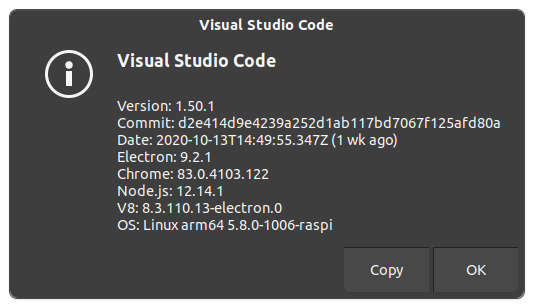Yesterday I wrote about how I was staying with Raspbian/Raspberry Pi OS 64-bit because it was, essentially, “smoother” to work with. Then I pulled out my 2GB and 4GB Raspberry Pi 4 little systems and attempted to start an update of the Raspbian OS 32-bit. It’s been a good six months since I worked with those little boxes, and I felt it was time to bring them up to date. I powered up the 4GB system and attempted a standard update (as full root) with apt update && apt upgrade -y. And it failed. For whatever reason apt couldn’t reach the Raspbian servers. After several more attempts and subsequent failures I shut it down. Since I’d already gone to the trouble to populate and initialize another µSDXC card with Ubuntu 20.10, I quickly swapped it onto the 4GB system and powered it back up again. It booted without issue, and to see if I could reach Ubuntu’s update servers, went through the same apt dance. It succeeded, updating Firefox in the process.
I know that getting the software ready for the Raspberry Pi is a huge volunteer effort. I get that, and I certainly appreciate that. But when the servers are unavailable for whatever reason, it tends to cast a pall over the OS. I checked to see if there were any messages about the Raspbian infrastructure being down or just having problems, and found nothing on the usual web sites and forums.
It’s at this point I have to ask myself if I should move on. I left Arch Linux precisely because it would not remain sane if left alone for long periods of time between updates. When my Arch installs essentially committed suicide when attempting an update, I made the decision to move to Raspbian, and never looked back. I might complain about the ages of some of the tools on an Raspbian OS, but I’ll take old and reliably working over new and busted ever single time. Now it’s reliably working Ubuntu updating over hit-or-miss working Raspbian. This is the older 32-bit version, not the 64-bit version that’s still in beta.
One strong point in Ubuntu’s favor is that it’s supported by a business, Canonical, that is totally devoted to OS development and support. The Raspberry Pi Organization is trying to support hardware and the surrounding ecosystem as well as its own OS. Now that Canonical has demonstrated their ability to support the Raspberry Pi, and now that the Pi is using hardware that can in turn support contemporary Ubuntu on ARM64, it might be a good time for the Raspberry Pi Organization to strike a formal deal with Canonical and let Canonical supply the ARM64 OS. This would allow the Raspberry Pi Organization to better concentrate their resources instead of spreading everything and everyone so thin. Ubuntu 20.10 still has some performance issues on the desktop, but at this point I’ll accept that because of the reliability of the operating system and its update servers.
If you think I’m being to harsh with Raspbian, here’s another interesting data point to consider. My most popular blog post for 2020 is “disable chromium update dialog on raspbian buster” ( /2020/04/11/disable-chromium-update-dialog-on-raspbian-buster/ ), a problem with Chomium that I wrote about back in April of this year, complete with work arounds.The ultimate fix is to recompile Chromium and rebuild its package, followed by a push out to the update servers. But it would appear that hasn’t happened, not if the continuing interest I keep getting on that article is any indication. And there are other little annoyances that would benefit from a similar refresh as well.
The only problem with switching to Ubuntu is support for older 32-bit hardware. There’s an awful lot of that out in the Real World, embedded in many commercial products as well as personal projects. Those will still need OS support that Ubuntu won’t be able to provide. Perhaps the practical solution is for the Raspberry Pi Organization to hand off 64-bit support to Canonical, while they go back and support just the older 32-bit hardware.
I will admit that my use of this hardware is not quite the norm for others. To me this is a hobby, so I tend to try and keep up with software updates, though not on the absolute bleeding edge. As a hobbyist I can afford to live with the kinks that new features can introduce, as long as I can get some reasonable feature. As of this point in time, I’ve been incentivized as it were to migrate to Ubuntu, at least for the latest Raspberry Pi hardware. Another adventure; we’ll see how that works out for me.




You must be logged in to post a comment.